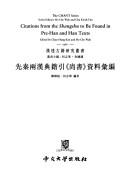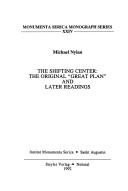| Listing 1 - 10 of 10 |
Sort by
|
Book
ISBN: 1554429781 Year: 2004 Publisher: Chicoutimi : J.-M. Tremblay,
Abstract | Keywords | Export | Availability | Bookmark
 Loading...
Loading...Choose an application
- Reference Manager
- EndNote
- RefWorks (Direct export to RefWorks)
Le Chou king n'est pas une histoire proprement dite : mais un recueil d'anciens documents relatifs à l'histoire de la Chine. Ces documents ont-ils été composés au fur et à mesure, peu après les événements, par des historiographes attachés à la cour impériale ? Les premiers ont-ils été écrits au temps de Iao et de Chouenn, ou seulement sous la dynastie des Tcheou ? Si leur origine se confond avec celle de la nation elle-même, ont-ils subi des retouches, des altérations dans le cours des siècles ? Si elle n'est pas antérieure au douzième ou au onzième siècle avant notre ère, quels monuments antiques leur ont servi de base ? Ces questions ont été l'objet de nombreuses et patientes recherches, de longues et savantes dissertations, et demeurent encore enveloppées de ténèbres. Quoi qu'il en soit, le Chou king nous fait connaître les idées qui avaient cours, sinon deux mille ans, au moins mille ans avant J. C., et nous donne des renseignements dignes de foi sur les temps postérieurs à l'avènement des Tcheou. Il fut revu, dit-on, par Confucius. En quoi consista le travail du grand philosophe ? Il est impossible de le dire d'une manière précise ; le fait n'est pas même absolument certain. En 213 avant notre ère, les livres classiques furent condamnés au feu par Chéu houâng, de la dynastie des Ts'în. Un lettré nommé [ ] ou Fŏu chēng, de Ts'i nan, capitale du Chan toung, conserva vingt-huit ou vingt-neuf chapitres du Chou king, soit dans sa mémoire, comme le dit K'òung Ngān kouŏ, descendant de Confucius, soit sur des tablettes tenues cachées, comme le raconte Sēu mà Ts'iēn. Il les rendit au public, quand vint la restauration des lettres sous les Hán. Vers l'année 150 avant J. C., K'oung Ngan kouo déchiffra et annota cinquante-huit chapitres du Chou king retrouvés sur des tablettes dans un mur de la maison de Confucius. Sa collection, qui était écrite en vieux caractères imitant la forme du têtard kouō teòu tzéu, fut appelée kòu wênn ancienne transcription ; celle de Fou cheng, en caractères plus récents ; fut nommée kīn wênn transcription moderne. Tchou Hi a laissé des remarques sur différents passages du Chou king. Nous avons cité son témoignage touchant la croyance des anciens à l'existence de l'âme après la mort, et à l'existence d'un Chang‑ti, roi du ciel, maître et gouverneur du monde. (Part. III, Chap. VII. 14, page 145, et Chap. VIII. 2, page 154). Il n'a pas entrepris l'explication complète de tout l'ouvrage. Son disciple Ts'ái Tch'énn a rempli cette tâche.Il est le commentateur officiel. Si son interprétation n'est pas toujours la meilleure, elle est du moins la plus autorisée, et la seule suivie dans les écoles. En conséquence, elle s'imposait au traducteur, qui se propose de reproduire l'enseignement classique. Le texte de Ts'ai Tch'enn et les éclaircissements nécessaires ont été fournis par le [ ] préparé sur l'ordre de K'ang hi et publié sous le règne de Ioung tcheng.
Book
ISBN: 7101005799 Year: 1989 Publisher: 北京 中華書局出版
Abstract | Keywords | Export | Availability | Bookmark
 Loading...
Loading...Choose an application
- Reference Manager
- EndNote
- RefWorks (Direct export to RefWorks)
Book
ISBN: 7532063909 Year: 1999 Publisher: 上海 上海教育出版社
Abstract | Keywords | Export | Availability | Bookmark
 Loading...
Loading...Choose an application
- Reference Manager
- EndNote
- RefWorks (Direct export to RefWorks)

Abstract | Keywords | Export | Availability | Bookmark
 Loading...
Loading...Choose an application
- Reference Manager
- EndNote
- RefWorks (Direct export to RefWorks)

ISBN: 3805002939 Year: 1992 Publisher: Nettetal Steyler Verlag
Abstract | Keywords | Export | Availability | Bookmark
 Loading...
Loading...Choose an application
- Reference Manager
- EndNote
- RefWorks (Direct export to RefWorks)
Book
ISBN: 9789863586111 9863586110 Year: 2018 Publisher: Taizhong Shi : Bai xiang wen hua,
Abstract | Keywords | Export | Availability | Bookmark
 Loading...
Loading...Choose an application
- Reference Manager
- EndNote
- RefWorks (Direct export to RefWorks)
Shu jing. --- China --- History --- Philosophy.
Book
ISBN: 9789863939924 9863939927 Year: 2018 Publisher: Taibei Shi : Yuan hua wen chuang gu fen you xian gong si,
Abstract | Keywords | Export | Availability | Bookmark
 Loading...
Loading...Choose an application
- Reference Manager
- EndNote
- RefWorks (Direct export to RefWorks)
Jiang, Sheng, --- Wang, Mingsheng, --- Shu jing.
Book
ISBN: 9789004343498 9789004343504 9004343504 9004343490 Year: 2017 Publisher: Leiden Boston
Abstract | Keywords | Export | Availability | Bookmark
 Loading...
Loading...Choose an application
- Reference Manager
- EndNote
- RefWorks (Direct export to RefWorks)
Origins of Chinese Political Philosophy is the first book in any Western language to explore the composition, language, thought, and early history of the Shangshu (Classic of Documents), one of the pillars of the Chinese textual, intellectual, and political tradition. In examining the text from multiple disciplinary and intellectual perspectives, Origins of Chinese Political Philosophy challenges the traditional accounts of the nature and formation of the Shangshu and its individual chapters. As it analyzes in detail the central ideas and precepts given voice in the text, it further recasts the Shangshu as a collection of dynamic cultural products that expressed and shaped the political and intellectual discourses of different times and communities. Contributors are: Joachim Gentz, Yegor Grebnev, Magnus Ribbing Gren, Michael Hunter, Martin Kern, Maria Khayutina, Robin McNeal, Dirk Meyer, Yuri Pines, Charles Sanft, David Schaberg, Kai Vogelsang.
S12/0216 --- S12/0320 --- China: Philosophy and Classics--Political philosophy --- China: Philosophy and Classics--Shujing 書經 Book of Documents (also Shangshu 尚書) --- Shu jing. --- Shu ching --- Shoo-king --- Shu king --- Chou king --- Schu-king --- Shang shu --- Shokyō --- Shōjo --- Sŏjŏn --- Sogyŏng --- Shōsho --- Jin wen shang shu --- Gu wen shang shu --- Kobun Shōsho --- Kobun Shōjo --- Jin gu wen Shang shu quan yi --- Political science --- Philosophy, Chinese. --- Ethics --- History. --- China --- Politics and government --- Ethics, Chinese --- Chinese philosophy
Book
ISBN: 9789570524338 Year: 2009 Publisher: 臺北 臺灣商務印書館
Abstract | Keywords | Export | Availability | Bookmark
 Loading...
Loading...Choose an application
- Reference Manager
- EndNote
- RefWorks (Direct export to RefWorks)
Shu jing. --- S12/0100 --- S12/0320 --- China: Philosophy and Classics--Bibliographies, dictionaries, yearbooks and collections --- China: Philosophy and Classics--Shujing 書經 Book of Documents (also Shangshu 尚書) --- Shu ching --- Shoo-king --- Shu king --- Chou king --- Schu-king --- Shang shu --- Shokyō --- Shōjo --- Sŏjŏn --- Sogyŏng --- Shōsho --- Jin wen shang shu --- Gu wen shang shu --- Kobun Shōsho --- Kobun Shōjo --- Jin gu wen Shang shu quan yi
Book
ISBN: 0520965825 9780520965829 9780520292253 0520292251 Year: 2016 Publisher: Berkeley
Abstract | Keywords | Export | Availability | Bookmark
 Loading...
Loading...Choose an application
- Reference Manager
- EndNote
- RefWorks (Direct export to RefWorks)
The Ling Shu, also known as the Ling Shu Jing, is part of a unique and seminal trilogy of ancient Chinese medicine, together with the Su Wen and Nan Jing. It constitutes the foundation of a two-thousand-year healing tradition that remains active to this day. Its therapeutic approach is based on a purely secular science of nature, with natural laws serving as guidelines for human behavior and medical treatment. No other text offers such broad insights into the thinking and manifest action of the authors of the time. Following an introduction, this volume contains the full original Chinese text of the Ling Shu, an English translation of all eighty-one chapters, and notes on difficult-to-grasp passages and possible changes in the text over time on the basis of Chinese primary and secondary literature of the past two thousand years and translator Paul Unschuld's own work. The Ling Shu reveals itself as a completely rational work, and, in many of its statements, a surprisingly modern one. It will provide the foundation for comparisons with the nearly contemporaneous Corpus Hippocraticum of ancient Europe and today's iterations of traditional Chinese Medicine as well.
Medicine, Chinese. --- Chinese medicine --- TCM (Medicine) --- Traditional Chinese medicine --- Traditional medicine --- Ling shu jing. --- Ling shu ching --- Huang-ti nei ching ling shu --- Kōtei naikei reisū --- Reisūkei --- Nei jing ling shu --- Ling shu --- Ling chʻoo king --- Canon of acupuncture --- Huangti nei jing ling shu --- Huangdi nei jing. --- Zhen jing --- Jiu juan --- Jiu ling --- Jiu xu --- academic. --- ancient china. --- chinese medicine. --- chinese translation. --- eastern medicine. --- eastern philosophy. --- eastern world. --- healing tradition. --- healing. --- hippocraticum. --- medical doctor. --- medical practitioner. --- medical treatment. --- medical. --- medicinal. --- medicine. --- natural laws. --- natural world. --- nature. --- scholarly. --- secular. --- traditional. --- translation.
| Listing 1 - 10 of 10 |
Sort by
|

 Search
Search Feedback
Feedback About UniCat
About UniCat  Help
Help News
News